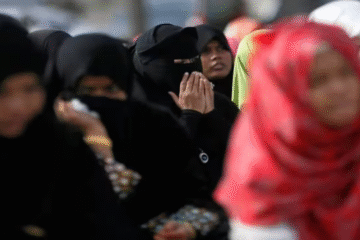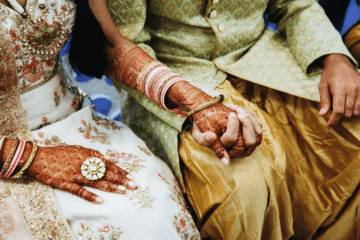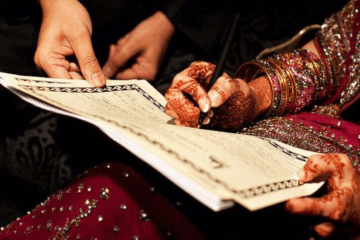This article is written by Pradumn Nigam of The University of Lucknow, an intern under Legal Vidhiya
LEGAL MAXIM
The legal maxim of dower or Mehar in Muslim marriage refers to the mandatory payment of a specified amount of money or property by the groom to the bride at the time of marriage. Dower or mehar is considered an important aspect of Muslim marriages, and its purpose is to ensure the financial security of the bride and to protect her rights in the event of divorce or the death of her husband. [1]
In Islamic law, the dower or mehar is a fundamental right of the bride and must be agreed upon by both the bride and groom at the time of marriage. The amount of dower or mehar can be negotiated by the parties, but it must be reasonable and within their means. [2]
The dower or mehar can be paid immediately or deferred to a later date, but it must be paid in full. The amount of dower or Mehar can vary depending on the economic status of the parties, the region or country where the marriage takes place, and other factors.
In addition to providing financial security for the bride, the dower or Mehar serves as a symbol of respect and honor for the bride, and it emphasizes the importance of treating her with dignity and respect throughout the marriage.
In conclusion, the legal maxim of dower or Mehar in Muslim marriage is an essential component of the Islamic law that provides financial security and protection for the bride. It is a fundamental right of the bride and must be agreed upon by both parties at the time of marriage. The amount of dower or mehar can be negotiated but must be reasonable and within the means of the parties.[3]
INTRODUCTION
Dower or Mehar refers to the gift or payment that a husband makes to his wife at the time of marriage or as part of the marriage contract. It is a traditional concept in many cultures, and its purpose is to provide financial security to the wife. In this response, we will discuss the meaning, nature, and classification of Dower or Mehar.[4]
Meaning of Dower or Mehar:
Dower or Mehar is a gift or payment that a husband makes to his wife at the time of marriage. It can be in the form of money, property, or any other valuable asset. The purpose of a Dower or Mehar is to provide financial security to the wife in case of divorce or the death of the husband. It is a legal obligation for the husband to provide Dower or Mehar to his wife, and it is considered a right of the wife. [5]
Nature of Dower or Mehar:
Dower or Mehar is a fundamental right of the wife, and it is a legal obligation for the husband to provide it. It is a type of financial security for the wife and ensures that she has some financial independence. The amount of Dower or Mehar is usually determined at the time of marriage, and it can be paid in installments or as a lump sum. It is the responsibility of the husband to pay the Dower or Mehar, and he cannot escape this obligation. [6]
Classification of Dower or Mehar:
There is two types of Dowers or Mehar: prompt Dower and deferred Dower.
Prompt Dower: It is the Dower or Mehar that is paid immediately to the wife at the time of marriage. It can be in the form of money, property, or any other valuable asset. The purpose of Prompt Dower is to provide immediate financial security to the wife.
Deferred Dower: It is the Dower or Mehar that is deferred to a later date, usually in case of divorce or the death of the husband. It can be paid in installments or as a lump sum. The purpose of a deferred Dower is to provide long-term financial security to the wife.
In overall we can say, Dower or Mehar is a gift or payment that a husband makes to his wife at the time of marriage or as part of the marriage contract. It is a legal obligation for the husband to provide Dower or Mehar, and it is considered a right of the wife. Dower or Mehar can be classified into prompt Dower and deferred Dower, depending on when it is paid to the wife. [7]
BACKGROUND
Dower or Mehar is an essential element in Islamic marriage, which is paid by the groom to the bride as a token of respect and appreciation. The concept of dower has been present in Islamic culture since the time of Prophet Muhammad (PBUH), and it is considered an important part of the marriage contract. In this article, we will explore the background, significance, and details of dower or Mehar in the Islamic religion.
Background:
The concept of dower or mehar was introduced in Islam to protect women’s rights and ensure their financial security in marriage. Before Islam, women had no legal rights in marriage and were treated as property. The dower system was established to protect women from being treated as commodities and to give them financial security in case of divorce or the death of their husbands.
Significance:
The payment of the dower or mehar is considered an obligation of the husband in Islamic marriage. It is a symbol of the husband’s commitment to his wife and his willingness to take on financial responsibility. The amount of the dower is agreed upon between the bride and the groom before the marriage contract is signed.
Details:
The amount of dower or mehar can be any amount agreed upon by the bride and groom. It can be paid in cash, property, or any other valuable asset. The dower is the exclusive property of the wife, and she has the right to use it as she sees fit.
The dower can be paid in full at the time of marriage, or it can be deferred to a later date. In some cases, the dower is paid in installments over a specified period.
If the husband fails to pay the dower or mehar, it is considered a breach of the marriage contract, and the wife has the right to seek legal recourse to enforce the payment.
In conclusion, the concept of dower or Mehar in Islamic marriage is a fundamental part of protecting women’s rights and ensuring their financial security. It is an obligation of the husband, and the amount is agreed upon by the bride and groom before the marriage contract is signed. The dower is the exclusive property of the wife and can be paid in cash, property, or any other valuable asset.
ISSUE ON THE TOPIC
Dower or Mehar is a fundamental aspect of Muslim marriage that is often subject to legal disputes. The following are some of the common problems in law related to dower or Mehar in Muslim marriage:
Non-payment of dower or mehar: One of the most common problems in Muslim marriage is the non-payment of a dower or mehar by the husband to his wife. This is a breach of the marriage contract and can lead to legal action.
Dispute over the amount of dower or mehar: The amount of dower or mehar is agreed upon at the time of the marriage contract, but disputes can arise over the amount agreed upon. This can lead to legal action and court proceedings to resolve the issue. [8]
Lack of clarity in the marriage contract: In some cases, the marriage contract may not be clear about the amount and terms of the dower or mehar. This can lead to legal disputes between the parties.
Forced dower or mehar: Sometimes, the husband may force the wife to agree to a certain amount of dower or Mehar, which can be against her will. This can lead to legal action for coercion and forced agreements.
Delayed payment of dower or mehar: The husband may delay the payment of the dower or mehar, which can cause financial hardship for the wife. This can lead to legal action to enforce the payment of the dower or mehar.
Dissolution of marriage without payment of dower or mehar: If the marriage is dissolved without the payment of dower or mehar, the wife may face financial hardship. This can lead to legal action to enforce the payment of the dower or mehar.
Inheritance issues: In some cases, disputes can arise over the distribution of the dower or mehar after the death of the husband. This can lead to legal action and court proceedings to resolve the issue.
Overall, dower or mehar is an important aspect of Muslim marriage, and any disputes related to it should be resolved through legal means. It is important for the parties involved to understand the terms of the marriage contract and seek legal advice if necessary. [9]
SOME CASES AND THEIR CASE LAWS
Case1
Maina Bibi vs Chaudhary Vakil Ahmad [1924] 52 IA 145
Maina Bibi v. Chaudhary Vakil Ahmad is a landmark case in Indian legal history that deals with the concept of “customary law” and its validity in the Indian legal system.
Facts:
The case involved a dispute over the property of a deceased person between two parties – Maina Bibi, the widow of the deceased, and Chaudhary Vakil Ahmad, the father of the deceased. The property in question was a piece of land that was being used for agricultural purposes. According to local customary law, the land would pass on to the son of the deceased, and not to the widow.
Judgment:
The case was initially heard by the District Judge of Shahabad in Bihar, who ruled in favor of Chaudhary Vakil Ahmad. Maina Bibi then appealed to the Patna High Court, which also ruled in favor of Chaudhary Vakil Ahmad. The case was then taken to the Privy Council, which was the highest court of appeal in British India.
The Privy Council, in its judgment, held that local customary law was not a binding source of law in the Indian legal system. The court stated that the Indian legal system was based on English law, which recognized only those customs that were not repugnant to justice, equity, and good conscience.
The court also observed that customary laws were often based on outdated practices and beliefs, and were not always consistent with modern notions of justice and equality. In this case, the court held that the customary law that prevented widows from inheriting property was discriminatory and went against the principles of justice and equality.
The Privy Council, therefore, ruled in favor of Maina Bibi and declared her the rightful owner of the property.
Significance:
The Maina Bibi case is significant as it established the principle that customary laws were not a binding source of law in the Indian legal system. The judgment paved the way for the codification and consolidation of various customary laws into formal legal systems. It also contributed to the development of a more modern and egalitarian legal system in India.
Case2
Ahmad Khan vs Shah Bano Begum [1985] SCR (3) 844
In the case of Ahmad Khan v. Shah Bano Begum (1985), the Supreme Court of India dealt with the issue of maintenance in Islamic law. The case arose when Shah Bano Begum, a Muslim woman from Indore, Madhya Pradesh, sought maintenance from her husband under Section 125 of the Code of Criminal Procedure, which applies to all religions. Shah Bano Begum’s husband, Mohammad Ahmed Khan, divorced her under Muslim personal law and refused to pay maintenance.
The case was first heard in the lower courts, which ordered Ahmad Khan to pay maintenance to Shah Bano Begum. However, the matter was appealed to the Supreme Court of India, which had to decide whether a Muslim husband was liable to pay maintenance to his divorced wife under the provisions of the Code of Criminal Procedure.
In its judgment, the Supreme Court held that the provisions of the Code of Criminal Procedure applied to all persons irrespective of their religion. Therefore, a Muslim husband was also liable to pay maintenance to his divorced wife under Section 125 of the Code of Criminal Procedure. The Court also held that the Muslim personal law did not provide a comprehensive scheme of maintenance for divorced Muslim women, and that the provisions of the Code of Criminal Procedure could be invoked by Muslim women to claim maintenance.
The judgment caused controversy and led to protests by some sections of the Muslim community, who felt that the Court was interfering with their personal law. The government responded by passing the Muslim Women (Protection of Rights on Divorce) Act, 1986, which sought to provide a more comprehensive scheme of maintenance for divorced Muslim women.
Overall, the Ahmad Khan v. Shah Bano Begum case was significant in that it recognized the right of Muslim women to claim maintenance under the Code of Criminal Procedure and helped to bring attention to the issue of gender inequality in Islamic law.
Case3
Abdul Kadir vs Salima [1886] 8 All 149
The Abdul Kadir v Salima (1886) case, also known as the “Dower Case”, was a landmark legal case in British India that dealt with the issue of dower, which is a form of financial security given to a Muslim woman by her husband at the time of marriage.
Facts:
Abdul Kadir was a wealthy Muslim man from the United Provinces (now Uttar Pradesh) in British India who had married Salima in 1878. At the time of their marriage, Abdul Kadir had promised to pay Salima a dower of 5000 rupees, but had only paid 1000 rupees. In 1884, Abdul Kadir died, leaving behind a large estate. Salima claimed her dower from Abdul Kadir’s estate, but his heirs refused to pay her the full amount, arguing that she was only entitled to the amount that had been paid at the time of marriage.
Judgment:
The case was heard by the British Indian courts, which upheld Salima’s claim to the full dower amount of 5000 rupees. The court held that under Islamic law, a wife was entitled to her full dower amount, regardless of whether it had been paid at the time of marriage or not. The court also held that the dower was a debt that was owed to the wife by the husband and that it was a charge on the husband’s estate.
The judgment was significant as it affirmed the rights of Muslim women in India to their full dower amount, and established the principle that the dower was a debt that could be claimed from the husband’s estate. The case also set a precedent for the interpretation of Muslim personal law in British India and had a lasting impact on the development of Muslim family law in the region.
SOLUTION / SUGGESTION
Dower or Mehar refers to the amount of money or property that a husband is obligated to pay to his wife either at the time of marriage or upon divorce.[10] If there is a dispute regarding Dower or Mehar in court, the following steps can be taken to resolve the issue:
Gather Evidence: The first step in any court case is to gather evidence to support your claim. This may include documents related to the marriage contract or any agreements made between the parties.
Hire a Lawyer: It is important to hire a lawyer who specializes in family law and has experience with dower or mehar cases. Your lawyer can advise you on the best course of action and represent you in court.
Mediation: In some cases, the court may require the parties to participate in mediation to resolve the issue. A mediator can help the parties reach a mutually acceptable solution without the need for a court trial.
Court Proceedings: If mediation fails, the case will proceed to court. The court will consider all the evidence presented and make a ruling based on the law and the facts of the case.
Enforcement of Judgement: Once the court has made a ruling, the winning party can take steps to enforce the judgment, such as obtaining a court order for the payment of the dower or mehar.
In summary, resolving a dower or mehar court case requires gathering evidence, hiring a lawyer, participating in mediation if required, going to court, and enforcing the judgment. It is important to seek legal advice and guidance throughout the process to ensure the best possible outcome.[11]
CONCLUSION
Overall, when it comes to court cases involving dower or mehar, it is essential to approach the matter with sensitivity and respect for the religious and cultural beliefs of those involved. It is important to ensure that the rights of both parties are upheld and that any decision made by the court is fair and just.
Overall, the dower or mehar is an important aspect of Islamic marriage that should be respected and upheld in court cases. It is essential to consider the individual circumstances of each case and ensure that a fair and just resolution is reached. [12]
REFERENCES
- https://www.writinglaw.com/dower-in-muslim-law/#:~:text=Dower%20or%20Mahr%20is%20a,in%20the%20pre%2DIslamic%20era.
- https://blog.ipleaders.in/concept-mahr-muslim-law/#:~:text=It%20is%20believed%20that%20in,the%20wife’s%20parents%20or%20guardians.
- https://indianlegalsolution.com/dower-under-muslim-law/
- https://www.legalserviceindia.com/legal/article-1204-status-of-unpaid-dower-under-muslim-law-a-critical-analysis.html
[1] https://www.ourlegalworld.com/mahr-or-dower-types-remission-and-its-enforcement/
[2] https://indianlegalsolution.com/dower-under-muslim-law/
[3] https://thelawcommunicants.com/importance-of-mahr-in-a-muslim-marriage/
[4] https://en.wikipedia.org/wiki/Mahr#:~:text=%22Dower%22%20is%20the%20English%20translation,wife%20also%20acquires%20inheritance%20rights.
[5] https://www.writinglaw.com/dower-in-muslim-law/
[6] https://www.lawnn.com/meaning-of-dower/
[7] https://www.tandfonline.com/doi/abs/10.1080/1528817X.2010.528594
[8] https://www.dawn.com/news/726611/the-importance-of-mehr
[9] https://www.hindustantimes.com/india/mehar-s-case-a-social-issue-swc/story-qWcDt5mKcR5TN8uqNKxRVN.html
[10] https://thelawcommunicants.com/a-case-study-on-dower-mhar-in-muslim-law/
[11] https://www.lawyersclubindia.com/articles/the-concept-of-dower-in-islam-related-case-laws-13939.asp
[12] https://www.lawinsider.in/columns/landmark-cases-on-mehr-under-muslim-law




0 Comments